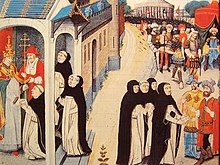Baiju
Baiju , German pronunciation " Baidschu " (also Baichu and Bāyjū , Mongolian ᠠᠰᠯᠥᠢᠦᠵᠺᠠ ᠧᠦᠢᠥ ᠵᠠᠺᠠᠠᠵ Bajdschu Nojan ), was a Mongolian commander in Persia ( bl. 1230-1260). He served under Great Khan Ögedei Khan and succeeded Chormagan as Noyan (military governor).

Life
Baiju took part in various campaigns by the Mongols, including the attack on Isfahan in 1228 and several actions in the Caucasus . He rose to deputy to Chormagan, who had been appointed Noyan for the West in 1229. When he was increasingly unable to lead the command due to paralysis, Baiju replaced him in 1242. Shortly afterwards he began a campaign against the Rum Seljuks in Anatolia and captured Erzurum . In 1243 he defeated the Seljuks under Kai Chosrau II in the battle of the Köse Dağ and made the Rum Seljuks vassals. The Mongols later put David VII , who had been a prisoner of the Rum Seljuks for several years, as a vassal on the Georgian throne.
The Mongols had only a few troops in the region and kept their vassals in check by punitive raids. Baiju led ten thousand communities (Mong. Tumen ) on a raid into Syria in 1246 and came into contact there for the first time with the Principality of Antioch . Despite his small successes there, his two campaigns against the Abbasids in Iraq in 1238 and 1246 were less successful. The renewed advance of the Mongols probably prompted Pope Innocent IV to send an embassy to the Mongols again. This appeared under the leadership of Nicolaus Ascelinus on May 24, 1247 in Baiju's camp in Sissian .
After Ögedei Khan's death, Baiju was replaced by the new Great Khan Güyük Khan in 1246 by Eljigidei. But in 1251/1252 Eljigidei and his whole family fell victim to the political cleansing of the new great khan Möngke Khan .
Under Baiju, the Mongols were able to maintain their control of what is now Iran in the 1240s and 1250s and had several vassals such as Rum Seljuks and Georgians. They interfered in the successors to the throne of their vassals and demanded tributes. But the Abbasids in Baghdad and the assassins in the Elburs Mountains remained independent until Hülegü came to power in 1255.
Baiju was probably accused by Hülegü of failing to expand Mongolian power and was replaced by Hülegü personally as commander in chief in 1255. But Baiju took part in other campaigns under Hülegü, for example against the Rum Seljuks in 1256, against Baghdad in 1258 and against Egypt and Syria in 1259.
It is not clear what happened to Baiju later. Hülegü withdrew with a large part of the army in 1260 and left the command of the remaining army to Kitbugha . According to Rashīd al-Dīn , Baiju was executed at Huegui's behest. His place was taken by Chormagan's son, Shiremun .
Mention in popular culture
In the second season of the Turkish cult series Dirilis Ertugrul , which tells the preliminary phase of the Ottoman Empire in the 13th century, Baiju (as "Baycu Noyan") appears as an opponent of the Ertugrul Gazi during his Anatolia campaign . Baiju is portrayed by Barış Bağcı.
literature
- The Cambridge Illustrated History of the Middle Ages. Volume 3: 1250-1520. Reprinted edition. Cambridge University Press, Cambridge et al. 2001, ISBN 0-521-26646-7 .
- Claude Cahen: Pre-Ottoman Turkey. A General Survey of the Material and Spiritual Culture and History c. 1071-1330. Reprinted edition. American Council of Learned Societies, New York NY 2008, ISBN 978-1-59740-456-3 .
See also
Web links
- Baiju . In: Ehsan Yarshater (Ed.): Encyclopædia Iranica (English, including references)
| personal data | |
|---|---|
| SURNAME | Baiju |
| ALTERNATIVE NAMES | Bayju Noyan; Baichu |
| BRIEF DESCRIPTION | Mongolian military governor in Persia |
| DATE OF BIRTH | 12th century or 13th century |
| DATE OF DEATH | 13th Century |